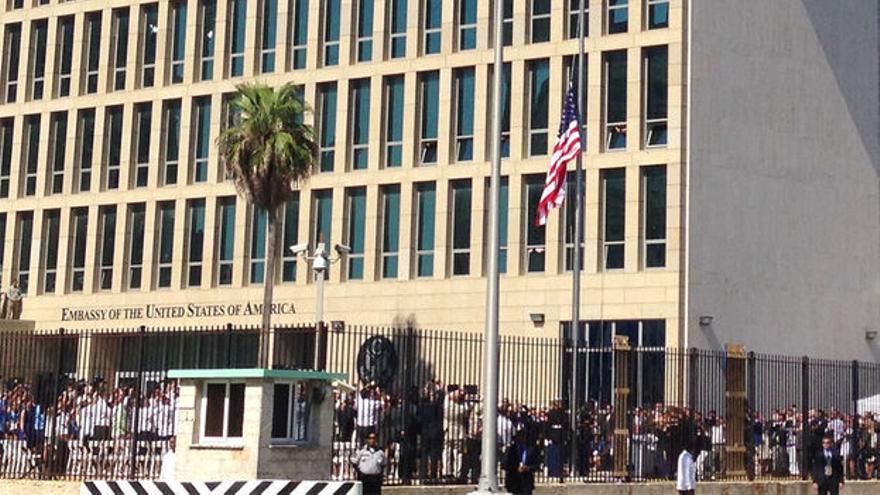
![]() 14ymedio, Havana, 26 May 2023 — Despite the barrage of applications and the difficulties in obtaining an appointment, since January 29,000 Cubans have benefited from the humanitarian parole program to enter the United States. The figure was given by Blas Nuñez-Neto, Acting Undersecretary of Border Policy and Immigration of the US Department of Homeland Security, who also announced that there will soon be new provisions for the family reunification process.
14ymedio, Havana, 26 May 2023 — Despite the barrage of applications and the difficulties in obtaining an appointment, since January 29,000 Cubans have benefited from the humanitarian parole program to enter the United States. The figure was given by Blas Nuñez-Neto, Acting Undersecretary of Border Policy and Immigration of the US Department of Homeland Security, who also announced that there will soon be new provisions for the family reunification process.
After several weeks of tension, the official said during a videoconference, “a lot of progress” begins to be seen in the program, which the United States offers to the citizens of the Island, as well as to Venezuelans, Nicaraguans and Haitians. The urgency to achieve the effectiveness of the parole derives from the “migration issue” represented by the border with Mexico, through which many Latin American citizens, including Cubans, are still trying to enter.
However, Nuñez-Neto was cautious when making predictions about the success of the program in the future: “It is too early to draw definitive conclusions or predict what will happen in the coming weeks,” he warned.
A recent report by the CBS News network, based on internal documents from the Department of Homeland Security to which they had access, indicated that there were more than 380,000 requests to sponsor Cubans at the end of last April. In just four months, 1.5 million petitions to sponsor citizens of Venezuela, Haiti, Nicaragua and Cuba had reached the immigration offices.
The situation was, clearly, an uncontrollable “avalanche” of procedures, complained the social workers of the US Citizenship and Immigration Service (USCIS), whose management already exceeds the possibilities of the institution. With a capacity to handle 30,000 monthly permits, they are receiving an average of 120,000 requests daily. In the first quarter, more than 580,000 petitions have been accumulated for Haitians, 120,000 for Venezuelans and more than 20,000 for Nicaraguans, in addition to those already cited for Cubans.
In addition, the volume of candidates to sponsor a humanitarian parole is much higher than expected and calls into question the sustainability of the program, since the times to process documentation have increased and migrants could resume the illegal path.
As for family reunification, the official admitted the notable delay in the procedures at the U.S. Embassy in Havana, which spent almost four years with the consular services semi-paralyzed and subjected to the sway of relations between Cuba and the United States.
The program is giving results in what is its first objective, said Nuñez-Neto: to stop the migratory flow on the border with Mexico, especially after the elimination — on May 12 — of Title 42, which facilitated the immediate expulsion of people from US territory under health arguments in times of Covid.
The reduction, 70%, has been significant, the undersecretary said: from the entry of 11,000 people a day, it has gone to only 4,000. However, he warned against the “coyotes and traffickers” who continue to spread “rumors” as bait to negotiate with migrants.
Nuñez-Neto also recalled that in the fiscal year 2021-2022 (from October 1 to September 30) there were 224,000 Cubans who entered through the Mexican border to the United States, not counting the 6,182 who tried to arrive by sea. In December 2022, a month before the parole program was implemented and at the most critical moment of the exodus, the figure was 44,064.
The program has not been without controversy and may be repealed in the future. A lawsuit filed by 20 Republican states, led by Texas, maintains that the Government is abusing its powers. The trial that will decide the future of humanitarian parole will be held on June 13 in the federal court of Victoria, in Texas.
Translated by Regina Anavy
____________
COLLABORATE WITH OUR WORK: The 14ymedio team is committed to practicing serious journalism that reflects Cuba’s reality in all its depth. Thank you for joining us on this long journey. We invite you to continue supporting us by becoming a member of 14ymedio now. Together we can continue transforming journalism in Cuba.
